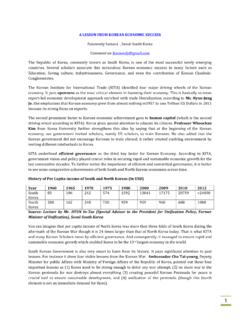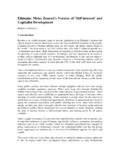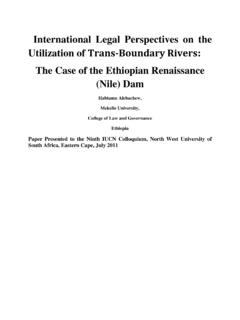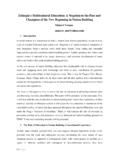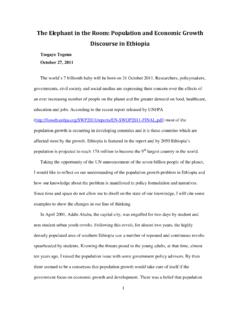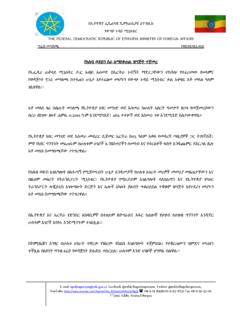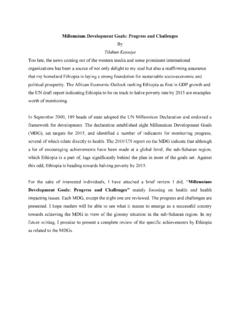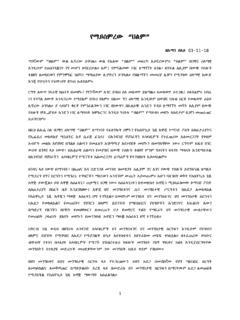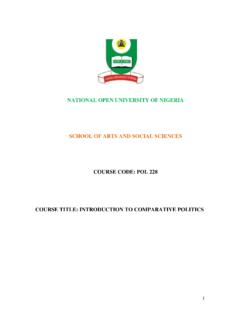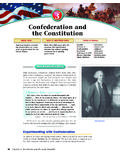Transcription of “The Developmental State and Federalism in …
1 The Developmental State and Federalism in Ethiopia'': Critique of Professor Clapham Habtamu Alebachew (Lecturer). Recently, I shared my brief outline of a monograph with colleagues and friends across domestic and foreign universities. The note focuses on what specifically two political developments presently in Ethiopia mean to political science and political sociology. The first is the incidence of aroused agitation among Ethiopian Muslims juxtaposed by supporters of opposition parties coming out to streets and, the second, manners of power successions among the ranks of the ruling party against the principles and practices of the Developmental State .
2 I realized from the various feedbacks, comments, and questions particularly that two key cardinal points in the monograph generated a degree of academic interest, leaving sensational and partisan reflections aside-cultural diversity versus the Developmental State . Slowly, the overall focus shifted to these iises. Most of the questions, which are my serious concern here, gravitated toward two themes. I may generalize the first as what the several jargons dominating the monograph clearly meant while the second revolved around the need for clarifying the link between theories /approaches with the said political developments in Ethiopia.
3 In specific terms, many friends of the first question category asked me what ethno-linguistic and religious diversity means and implies to the Developmental State versus the liberal State , in general. These friends raised concern how I explained the causes, scopes, management mechanisms, and possible consequences of the Muslim agitation in Ethiopia. The second question tended to focus on the theoretical and practical consistencies between the liberal principles of pluralism and behavior of the Ethiopian government as a Developmental State . 1. The Crux of the Matter In the mean time, however, a colleague from Mekelle University challenged some of my arguments by citing Professor Clapham's (a veteran Ethiopianist scholar) recent public speech in Mekelle and Addis Ababa as a major source.
4 I soon searched for the printed copy of the speech and found it at the English Reporter. The Reporter understood Clapham as saying centrally: cultural homogeneity and the Developmental State are so coextensive that the former is a natural prerequisite for the latter.' If I am not mistaken, I, in my turn, understood this statement to mean that the Developmental State is essentially an institution, difficult, if not, impossible if a society is culturally diverse. This argument appears to have gotten its origins from the observation that most of the Asian countries conventionally dubbed as Developmental ' are generally homogenous societies ethno-linguistically and religiously.
5 Having accepted this argument as plausible and most relevant to explain present Ethiopia, another colleague from Adama University came up with a critical view. For this colleague, as I interpreted his statements written in Amharic-mixed English, the Clapham contradiction' between the Developmental State and ethno-religious diversity is the more likely explanation for the existing Muslim agitation and many other set backs bubbling up with a potential threat against the State 1. itself. From this, he directly progressed to suggest the alternative course of State policy that it should embrace liberalism as the true panacea'.
6 I also received a comment from South Africa, Pretoria, by another friend who described and equated the meaning of the Developmental State ' thesis with the post-Soviet revision of Marxism-Leninism. For this friend, the majority of South African blacks and the white minority, who were bitter enemies before 20 years, have learned now to live together peacefully thanks to liberalism. He raised the recent Muslim agitations in Ethiopia, a country of Muslim-Christian modus Vivendi for more than 13 centuries, is an evidence for the fact that the Developmental State ' is incapable to insure what he called a secular peace.
7 ' This friend, a lawyer by profession, cited Professor Clapham as correctly identifying the origins of the policy crisis. I learnt from the arguments in the negative side, of course, there have been some appreciable grains of truth in the evaluation of the socio-cultural structures of most Developmental states . On the issue of congruity between ethno-cultural homogeneity and the Developmental State , it is true that dominant cultural homogeneity characterizes South Korea, China, Japan, Hong Kong, Thailand, and Indonesia, to mention the major ones. Their majority societies share similar languages and religious codes.
8 It is also true that most, if not all, Developmental states are strongly centralized unitary arrangements. Historically and politically, regimes and successive governments in these states have borne the conspicuous traditional marks of heavy temptations toward authoritarianism, or in the words of Samuel Huntington, legacies of oriental despotism' as a shared behavior. It is against this background, that I tried to read professor Clapham and his contradiction' thesis. One may readily agree with any argument that Ethiopia stands probably as the sole Developmental State characteristically marked by ethno-linguistic and cultural diversities.
9 This undoubtedly produced the existing federation as a response to the long-standing intercultural schism distinguishing the country from others. In the mean time, the government came up with the Developmental State approach. This political development for Clapham has been an odd one because while he understands the Developmental State as a centralizing process possible in homogenous states , Federalism , as a decentralizing process--its direct contrast organically inconsistent. In other words, the natural combination is right when Federalism comes together with liberalism (Clapham is silent about this point) while the Developmental State chains itself with strong centralism.
10 It is true that Federalism in Ethiopia signifies, crudely speaking, the increased disengagement of the State from the monopolistic control of cultural diversities. Contrarily, the Developmental State represents the increased engagements of the State in its roles of economic management and development. These two engagements apparently follow diverging courses with still apparently little or no common point of convergence in the middle. I feel that Professor Clapham has traveled the safe journey of comparative analysis up to this point before coming face to face with the Devil in the details. To begin with, why did the ruling party adopt ;the Developmental State thesis as a development approach in Ethiopia?
